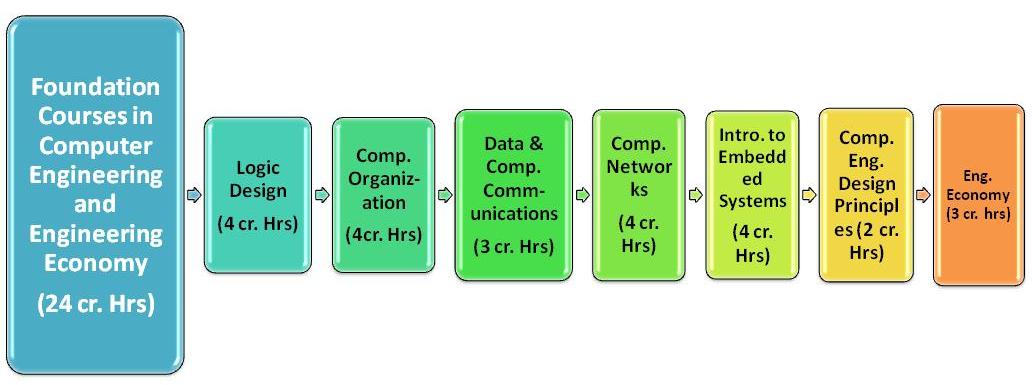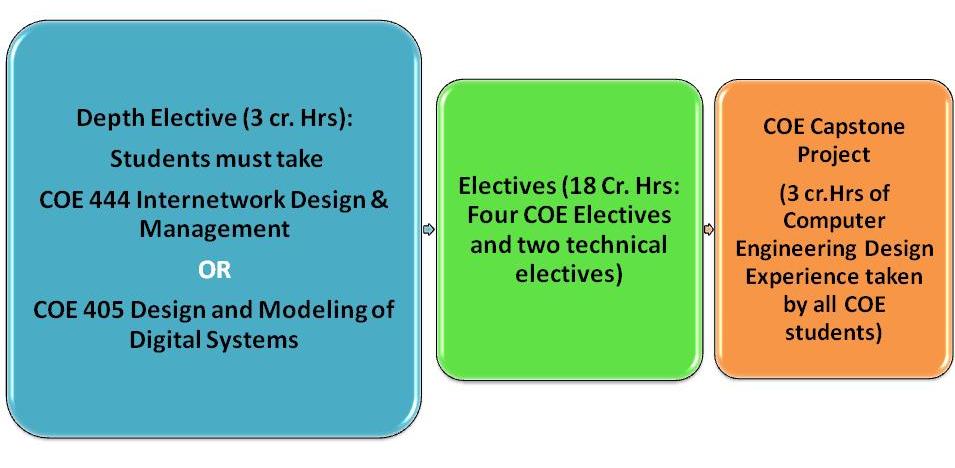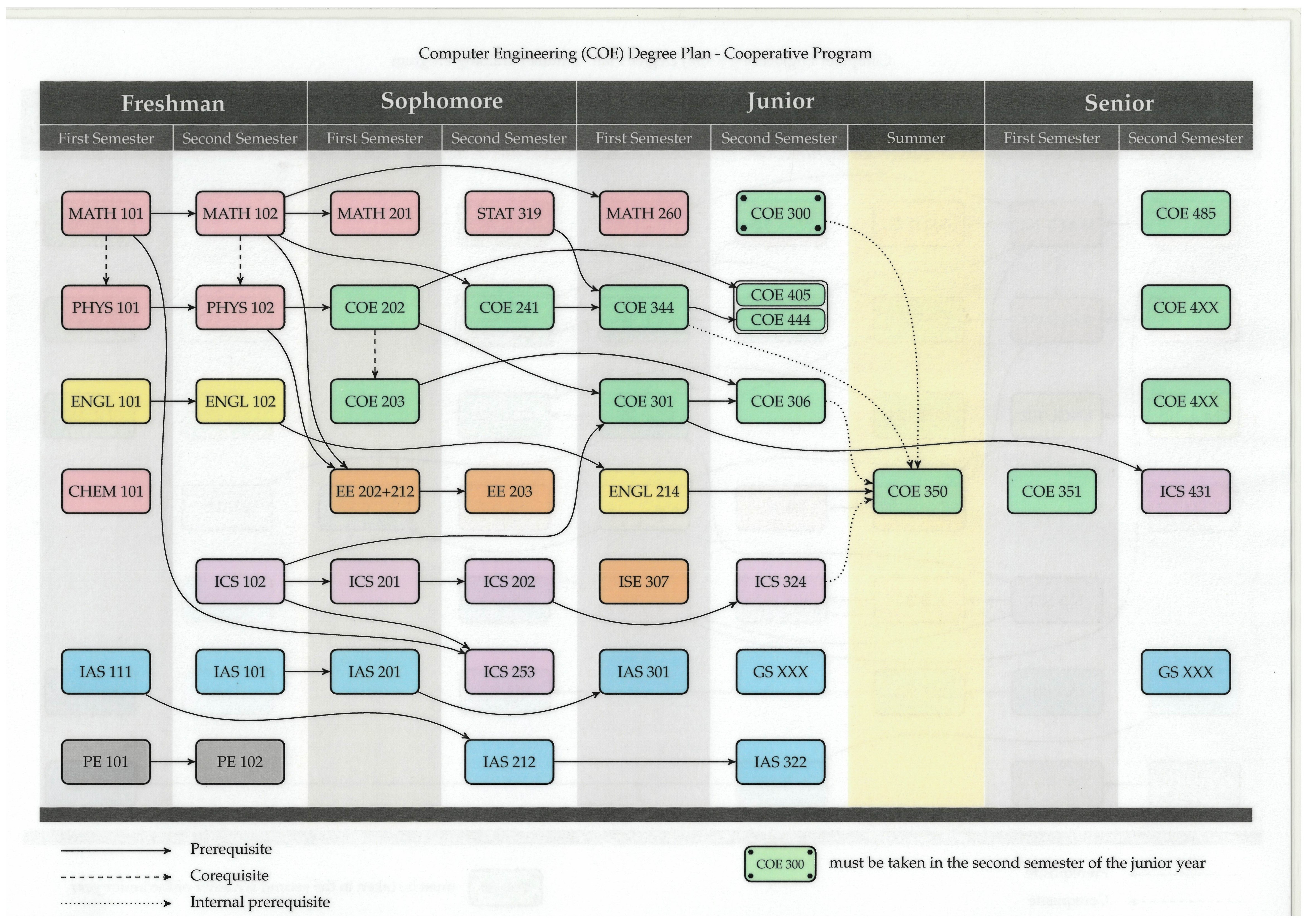Degree Information (Old)
Introduction
The objectives of the COE computer engineering program are to produce computer engineering graduates who are prepared to:
Practice their profession with confidence and global competitiveness and make intellectual contributions to it; Pursue a life-long career of personal and professional growth with superior work ethics and character, and Pursue advanced study and research at the graduate level.
Program Outcomes
a) Ability to apply knowledge of mathematics, science, and engineering,
b) Ability to apply knowledge of mathematics, science, and engineering,
c) Ability to design and conduct experiments, as well as to analyze and interpret data,
d) Ability to design a system, component, or process to meet desired needs,
e) Ability to function on multi-disciplinary teams,
f) Ability to identify, formulate, and solve engineering problems,
g) Understanding of professional and ethical responsibility,
h) Ability to communicate effectively,
i) Broad education is necessary to understand the impact of engineering solutions in a global and societal context,
j) Recognition of the need for, and an ability to engage in life-long learning knowledge of contemporary issues, and
k) Ability to use the techniques, skills, and modern engineering tools necessary for engineering practice.
In addition to the program outcomes above which form the standard ABET criteria, we have adopted three more outcomes as recommended by ABET for computer engineering programs (below). The first two emphasize the knowledge of probability and statistics and discrete mathematics which are considered important for computer engineers. The third outcome emphasizes integration aspects between hardware and software components in the design process. This is different from outcome (c) – above which addresses design aspects in general, which may not include the integration of hardware and software components.
l) Knowledge of probability and statistics and their applications in Computer engineering,
m) Knowledge of discrete Mathematics, and
n) Ability to design a system that involves the integration of hardware and software components.
Student Outcomes
Following a review of the ABET Criteria and the program objectives, it has been decided by the Computer Engineering faculty that the ABET Criteria (a - k) encompass the spirit of our educational vision. Therefore, outcomes (a - k) were adopted as the Computer Engineering Program Outcomes in addition to an additional outcome (l) unique to Computer Engineering programs. The Computer Engineering Program Outcomes are:
(a) an ability to apply knowledge of mathematics, science, and engineering.
(b) an ability to design and conduct experiments, as well as to analyze and interpret data.
(c) an ability to design a system, component, or process to meet desired needs.
(d) an ability to function on multi-disciplinary teams (Our interpretation of multidisciplinary teams includes teams of individuals with similar educational backgrounds focusing on different aspects of a project as well as teams of individuals with different educational backgrounds).
(e) an ability to identify, formulate, and solve engineering problems.
(f) an understanding of professional and ethical responsibility.
(g) an ability to communicate effectively.
(h) the broad education necessary to understand the impact of engineering solutions in a global and societal context.
(i) a recognition of the need for, and an ability to engage in life-long learning (Our interpretation of this includes teaching students that the underlying theory is important because the technology changes, coupled with enhancing their self-learning ability).
(j) knowledge of contemporary issues (Our interpretation of this includes presenting students with issues such as the impact of globalization, and the outsourcing of both engineering and other support jobs as practiced by modern international companies).
(k) an ability to use the techniques, skills, and modern engineering tools necessary for engineering practice.
| Program Educational Objectives | Program Outcomes |
| 1) Established a successful professional career as computer engineer with demonstrated leadership capabilities | a, b, c, d, e, g, k |
| 2) Demonstrated an ability to pursue successful professional and career growth | f, i, h, j |
| 3) Success in graduate and professional studies/programs if they chose to do so | a, b, e, g, i, k |
Important Note: The COE program obtained ABET accreditation last year based on the above missions, program objectives, program outcomes, and mapping. They are kept exactly the same which will ensure the next ABET accreditation INSHA ALLAH.
Requirements for the B.S Degree in Computer Engineering
(With Summer Training)
(a) General Education Requirements (52 Credit Hours)
| Communications Skills | ENGL 214, IAS 101, 201, 301 | 9 |
| Computer Programming | ICS 102 | 3 |
| Chemistry | CHEM 101 | 4 |
| English | ENGL 101, 102 | 6 |
| Islamic Studies | IAS 111, 212, 322 | 6 |
| Mathematics | MATH 101, 102, 201, 208 | 14 |
| Physical Education | PE 101, 102 | 2 |
| Physics | PHYS 101, 102 | 8 |
| | 52 |
(b) Core Requirements (53 Credit Hours)
| COE | 202, 203, 241, 300, 301, 306, 344, 485 | 24 |
| ICS | 201, 202, 253, 431 | 15 |
| EE | 201, 203 | 8 |
| ISE | 307 | 3 |
| STAT | 319 | 3 |
| | 53 |
(c) Electives (27 Credit Hours)
| COE Depth Electives | COE 405 "or" COE 444 | 3 |
| COE Electives | COE 4xx I, COE 4xx II, COE 4xx III, COE 4xx IV | 12 |
| Technical Electives (from the list) | XE I, XE II | 6 |
| General Studies | GS xxx I, GS xxx II | 6 |
| | 27 |
(d) Summer Training (0 Credit Hours)
| Summer Training | COE 399 | 0 |
| | 0 | |
| The Total Number of Credit Hours Required | | 132 |
Requirements for the B.S Degree in Computer Engineering
(With COOP)
(a) General Education Requirements (52 Credit Hours)
| Communications Skills | ENGL 214, IAS 101, 201, 301 | 9 |
| Computer Programming | ICS 102 | 3 |
| Chemistry | CHEM 101 | 4 |
| English | ENGL 101, 102 | 6 |
| Islamic Studies | IAS 111, 212, 322 | 6 |
| Mathematics | MATH 101, 102, 201, 208 | 14 |
| Physical Education | PE 101, 102 | 2 |
| Physics | PHYS 101, 102 | 8 |
| | 52 |
(b) Core Requirements (57 Credit Hours)
| COE | 202, 203, 241, 300, 301, 306, 344, 485 | 24 |
| ICS | 201, 202, 253, 324, 431 | 19 |
| EE | 201, 203 | 8 |
| ISE | 307 | 3 |
| STAT | 319 | 3 |
| | 57 |
(c) Electives (15 Credit Hours)
| COE Depth Electives | COE 405 "or" COE 444 | 3 |
| COE Electives | COE 4xx I, COE 4xx II | 6 |
| General Studies | GS xxx I, GS xxx II | 6 |
| | 15 |
(d) Cooperative Work (9 Credit Hours)
| Cooperative Work | COE 350, 351, 352 | 9 |
| | | 9 |
| The Total Number of Credit Hours Required | | 133 |
Program Structure







